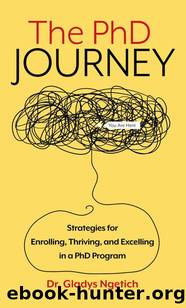The PhD Journey: Strategies for Enrolling, Thriving, and Excelling in a PhD Program by Gladys Ngetich

Author:Gladys Ngetich [Ngetich, Gladys]
Language: eng
Format: epub
Tags: -
Publisher: Aviva Publishers
Published: 2022-05-20T21:00:00+00:00
4.3 Assemble crucial tools for the journey ahead
You are about to embark on a long and arduous journey. Carve out some time, in the beginning, to intentionally plan for the journey ahead. Abraham Lincoln has been famously attributed as saying, âIf I had five minutes to chop down a tree, Iâd spend the first three sharpening my axeâ. Take some time in the beginning to sharpen your axe. Think of a time when you had an important long road trip. What did you do a few days before the trip? You meticulously planned for it. You packed extra clothes. You got some snacks and drinks. You packed extra tires. Similarly, the PhD journey you are about to start will feel like a long trip.
Following are eight activities you can do to prepare.
1.Take workshops on essay writing, research paper writing, research presenting, etc. The PhD journey is inherently filled with writing and presentations. Youâll be writing research papers and sometimes even grant proposals. Youâll have to orally present your research findings. And, ultimately, youâll be required to write a coherent thesis detailing your PhD research work. Most institutions will offer these courses for free or at subsidised prices. I attended countless workshops during the early stages of my PhD journey. The workshops I took included Foundations for a Successful DPhil, Research Skills Toolkit workshops, Scientific Writing: Getting Your Paper Published, Scientific Research Writing for Non-Native English Speakers, Preparing for Learning and Teaching at Oxford: Tutors and Class Assistants, Presentation Skills for Beginners, and Science Writing for Non-Native Speakers among others. The invaluable skillsâwriting, speaking, presentation, project management skillsâthat I gained from these workshops have been so helpful even beyond my PhD that I still utilise them to date.
2.Attend some extra classes. As a university policy, some universities might require you to complete compulsory course units and earn credits. Even if that isnât a requirement at your university, it will help to attend some of the classes related to your research. My research was in thermofluids, so I took some classes related to thermofluids: Heat and Mass Transfer, Applied Fluid Mechanics, and Engineering Thermodynamics course units. From October 2016 to October 2018, I tutored engineering undergraduate students at Oriel College (one of the University of Oxfordâs colleges). Tutoring these courses boosted my foundational knowledge of thermofluids. If possible, attend classes that arouse your interest in other topics, even those not related to your work. A friend attended all sorts of lectures, including philosophy and theology. I admired that greatly. In retrospect, I wish I had stretched out of my comfort zone a little bit and attended lectures that had nothing to do with engineering.
3.Learn from predecessors. Actively network across departments/universities. Talk with other PhD students. The friendships/networks you form now might help you even after you earn your PhD. You donât have to reinvent the wheel. Learn from your predecessors. They can advise you on what to anticipate in the journey. That way, you can channel your limited energies on improving the wheel instead of reinventing it.
Download
This site does not store any files on its server. We only index and link to content provided by other sites. Please contact the content providers to delete copyright contents if any and email us, we'll remove relevant links or contents immediately.
| Administration | Adult & Continuing Education |
| Business School Guides | College Guides |
| Financial Aid | Graduate School Guides |
| Law School Guides | Medical School Guides |
| Test Preparation | Vocational |
Spare by Prince Harry The Duke of Sussex(5174)
Navigation and Map Reading by K Andrew(5150)
Tuesdays with Morrie by Mitch Albom(4767)
Machine Learning at Scale with H2O by Gregory Keys | David Whiting(4292)
Cracking the GRE Premium Edition with 6 Practice Tests, 2015 (Graduate School Test Preparation) by Princeton Review(4271)
Never by Ken Follett(3935)
Goodbye Paradise(3798)
What It Really Takes to Get Into Ivy League and Other Highly Selective Colleges by Hughes Chuck(3742)
Fairy Tale by Stephen King(3368)
Harry Potter and the Prisoner of Azkaban (Book 3) by J. K. Rowling(3346)
Pledged by Alexandra Robbins(3170)
Kick Ass in College: Highest Rated "How to Study in College" Book | 77 Ninja Study Skills Tips and Career Strategies | Motivational for College Students: A Guerrilla Guide to College Success by Fox Gunnar(3114)
Reminders of Him: A Novel by Colleen Hoover(3076)
A Dictionary of Sociology by Unknown(3071)
Sapiens and Homo Deus by Yuval Noah Harari(3061)
The Social Psychology of Inequality by Unknown(3014)
Graduate Admissions Essays, Fourth Edition: Write Your Way into the Graduate School of Your Choice (Graduate Admissions Essays: Write Your Way Into the) by Asher Donald(2906)
Will by Will Smith(2906)
Zero to Make by David Lang(2777)
